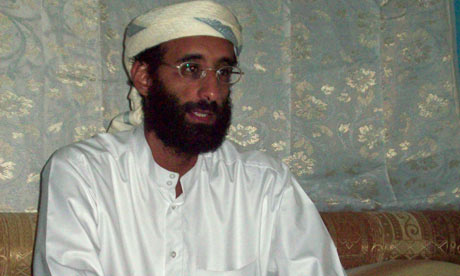Anwar al-Awlaki, the Yemeni cleric said to have met the Nigerian accused of the Christmas Day terrorist plot. Photograph: AP
The decision to place Awlaki on a US hit list followed a national security council review because of his status as an American citizen.
"Awlaki is a proven threat," a US official told Reuters. "He's being targeted."
Born in New Mexico to Yemeni parents, Awlaki has been accused of encouraging terrorism in his sermons and writings. He is believed to be in hiding in Yemen's rugged Shabwa or Mareb regions, an area that has become a haven for jihadis. He has been linked to Major Nidal Malik Hasan, the army psychiatrist accused of killing 13 people at Fort Hood, Texas, in November, and to Umar Farouk Abdulmutallab, the Nigerian charged with trying to blow up a Detroit-bound airliner on Christmas Day.
It is extremely rare, if not unprecedented, for an American to be approved for "targeted killing", officials told the New York Times. A former senior legal official in the Bush administration said he did not know of any American who was approved for targeted killing under the former president.
The decision to place Awlaki on a hit list took place this year, the paper said, as US counterterrorism officials judged he had moved beyond inciting attacks against the US – he has a large following among English-speaking Muslims – to participating in them.
"The danger Awlaki poses to this country is no longer confined to words," an official told the New York Times. "He's gotten involved in plots."
The policy of targeted killings is controversial. President Gerald Ford issued an executive order banning political assassinations in 1976. However, Congress approved the use of military force against al-Qaida after the 9/11 terrorist attacks. People on the target list are considered to be military enemies of the US and therefore not subject to the ban on political assassination.
In February, the director of national intelligence, Dennis Blairan, alarmed civil liberties groups when he told Congress that the US may, with executive approval, deliberately target and kill US citizens suspected of being involved in terrorism.
Under Obama's watch, the US has stepped up attacks on al-Qaida figures around the world from Somalia to the Afghanistan-Pakistan border through the use of Predator drones or other aircraft. The Pakistani government tacitly permits CIA-operated unmanned aircraft to target terrorist sites and militants up to 50 miles inside the country, and there have been reports of helicopter-borne raids into Pakistani territory.





.jpg)












No comments:
Post a Comment